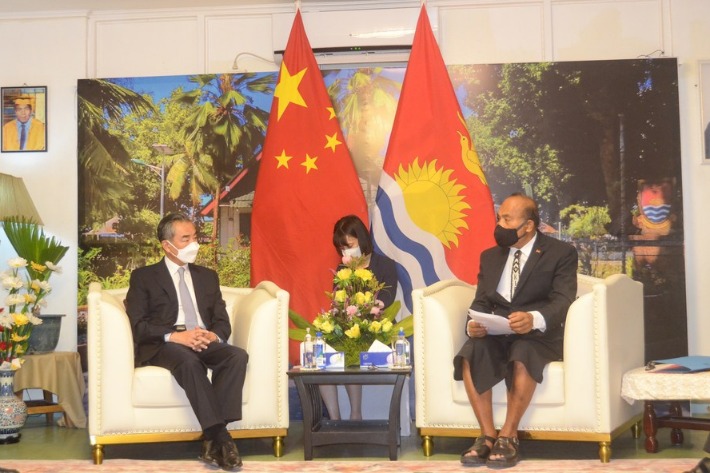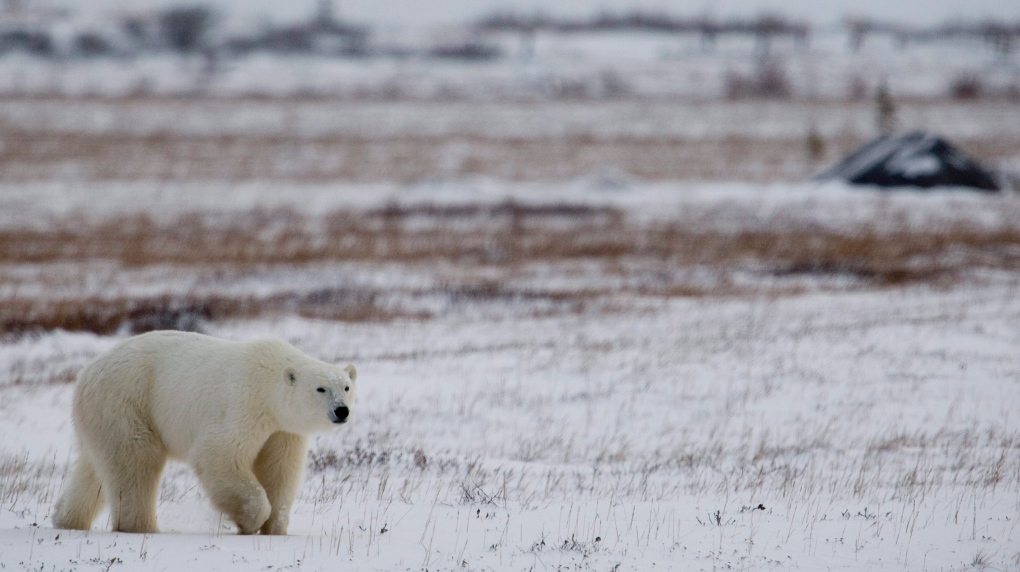Kiribati and China pledged to deepen cooperation in jointly building the Belt and Road and synergize it with Kiribati’s 20-Year Vision, expand cooperation in various fields, and focus on improving people’s livelihoods.
Kiribati President and Foreign Minister Taneti Maamau (R) meets with Chinese State Councilor and Foreign Minister Wang Yi in Tarawa, Kiribati, May 27, 2022. [Photo/Xinhua]
TARAWA — Kiribati and China on Friday pledged to strengthen cooperation in building the Belt and Road, tackling climate change and tackling the COVID-19 pandemic.
When meeting with Chinese State Councilor and Foreign Minister Wang Yi, Kiribati President and Foreign Minister Taneti Maamau said the visit of the Chinese delegation brings mutual trust, friendship and cooperation, which which is of paramount importance in the relations between Kiribati and China.
Since the resumption of diplomatic relations between the two countries in September 2019, the practical cooperation between the two parties has yielded fruitful results and the substantial improvement in the welfare of the people of Kiribati has been witnessed, demonstrating the sincerity, friendship and the fulfillment of China’s promises, the president said.
Kiribati unswervingly upholds the one-China principle and firmly supports China in building a community with a shared future for mankind, the president said.
Expressing his gratitude to China for its help and assistance in the fight against the pandemic, economic development and infrastructure construction, the President of Kiribati said his country was determined to take bilateral relations to a new height in order to to bring more benefits to the people of Kiribati.
Wang said China is not only Kiribati’s friend, but also the most reliable friend of all developing countries.
China will firmly safeguard the legitimate interests of developing countries, especially small and medium-sized countries in international and multilateral arenas, he added.
Since the resumption of diplomatic relations between China and Kiribati more than two years ago, the two sides have witnessed the rapid development of bilateral relations with extensive cooperation in all fields, which has brought tangible benefits to the people of Kiribati,” Wang said.
The two countries trust and support each other, which has become a model of equal treatment between big and small nations, Wang said.
Facts have shown that Kiribati’s decision to resume diplomatic relations with China is in the fundamental interests of the Kiribati people, Wang said.
Noting that the world is still experiencing the pandemic, wars and poverty, Wang said the United States and its allies, however, are determined to contain China’s development. Essentially, they do not want to see the success of a non-Western force and greater solidarity and cooperation among developing countries.
The development and revitalization of China and other developing countries are their legitimate rights. In this sense, developing countries that support China in safeguarding its core interests are actually supporting themselves. Similarly, China, which facilitates the economic development of developing countries, is actually helping itself, Wang said.
The two sides agreed to continue to strengthen their cooperation in the fight against COVID-19. The first group of the Chinese medical team arrived in Kiribati with the Chinese delegation to help Kiribati fight against the epidemic and provide medical services to the Kiribati people.
The two sides pledged to deepen cooperation in the joint construction of the Belt and Road and synergize it with Kiribati’s 20-Year Vision, expand cooperation in various fields and focus on improving the livelihoods of the people. They also pledged to take full advantage of Kiribati’s resource advantages and create new strengths in maritime cooperation on the principle of ecological protection.
The two sides pledged to cooperate in the fight against climate change and agreed that developed countries should genuinely shoulder their historical responsibilities, fulfill their climate change financing commitments to developing countries and help developing countries to build their capacity.
Wang stressed that China is firmly committed to a green and low-carbon development path and will help small island countries fight climate change through South-South cooperation.
After the meeting, the two sides attended a signing ceremony for cooperation documents including joint construction of the Belt and Road, disaster prevention and reduction, infrastructure construction, tourism and livelihood of the people.




